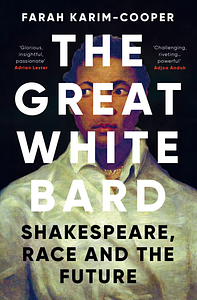You need to sign in or sign up before continuing.
Take a photo of a barcode or cover
informative
reflective
slow-paced
challenging
informative
inspiring
challenging
informative
reflective
medium-paced
Listened to this as an audiobook, enjoyed the experience.
Fascinating, and digestible despite its complexity. I have been thinking about it non-stop since I started listening, and I'm seeing racialisation/racecraft in everything. So many worthwhile things to explore in more detail!
Exactly what I wanted to read after seeing the Tempest and Othello this year. A broad discussion of racialisation in Shakespeare’s canon, much of which I’m not too familiar with but found very engaging nonetheless!
due back at the library, the writing style was a little dull for me to get through the whole thing in time this first attempt, but I hope to pick it up again soon
challenging
dark
emotional
informative
reflective
medium-paced
Shakespeare was constructed as an emblem of English exceptionalism, as a native genius.
It is time to let that go. (p. 277)
...the production shed light upon Shakespeare's presence within the history of race, slavery and empire and made clear that white Britain (or America for that matter) is not synonymous with Shakespeare. No one group can claim entitlement over these works or has special access to the gloriously diverse, discomforting and capacious store of words that is Shakespeare.
...We all have the right to claim the Bard. (p. 280)
Karim-Cooper seems conflicted, and understandably so. She's a woman of color who's a Shakespeare scholar, who actually works at the Globe. (Edit. She literally just started as the Director of the Folger Library in DC.) That second quote is literally how the book ends, and is obviously supposed to be our takeaway. But the message throughout the book is mixed. She points out the racism in the plays, even in the plays that you don't necessarily think are problematic. (She spends a bit of time on Much Ado About Nothing in which she both points out the line where Hero is called "too brown for a fair praise" but also spends a lot of time discussing how Hero is described as being incredibly white.) But she also portrays Shakespeare as intersectional. I think ultimately, my takeaway is that Shakespeare frequently used racist language (though there were times when I felt like Karim-Cooper was reaching a bit in describing certain words or phrases as such) but his stories are actually more forward-thinking than we might imagine for someone writing at the turn of the 17th century.
I enjoyed learning about the world of Shakespeare, of the foreigners living in various cities, of the depiction of Black people in certain paintings, of Jewish people being kicked out of England but not other countries, etc. Karim-Cooper pointing out the number of times Shakespeare referred to "the Ethiop" and how audiences may have reacted to those mentions was illuminating. It also made me think about language and the inherent racism in certain words and phrases.
That said, I found this a bit of a slog, unfortunately. There's some great information in here. I think I would've appreciated more insights from actors of color who've dealt with these plays; Karim-Cooper gives us a handful of quotes, but I found the perspective of "This is how reading these words affects us" incredibly powerful and would've appreciated more of it.
Ultimately, I don't know how successful I found Karim-Cooper's argument, but I cant be too mad at spending more time learning about Shakespeare.
informative
fast-paced






